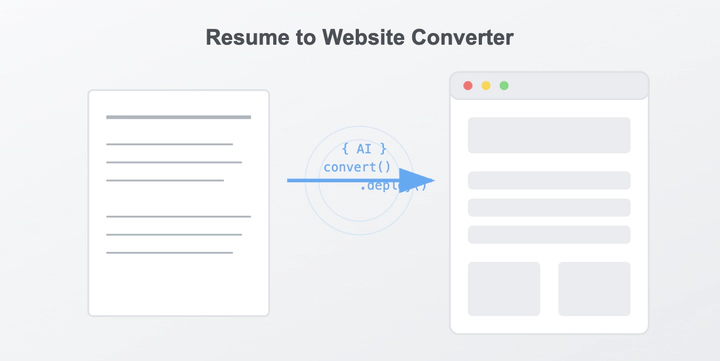Resume2Web
 An image illustration created by Claude
An image illustration created by ClaudeOverview
A revolutionary web application that transforms traditional resumes into elegant personal websites, leveraging AI technology and automated deployment processes. The platform simplifies personal branding by converting static resume content into dynamic, professionally designed websites hosted on GitHub Pages.
Value Proposition
- Instant conversion of resume content into a polished personal website
- AI-powered content enhancement and personal branding
- Seamless deployment process requiring minimal technical knowledge
- Professional online presence creation in minutes instead of hours or days
- Cost-effective alternative to custom website development
Technical Architecture
Resume Parsing & Enhancement
- Document Processing
- PDF and Word document parsing using OCR and text extraction
- Structured data extraction for education, experience, and skills
- JSON schema standardization for extracted information
- AI Content Generation
- Integration with LLM APIs for natural language processing
- Professional bio generation based on career history
- Skill summary and achievement enhancement
- Keywords optimization for better SEO
- Personal Branding
- Algorithmic logo generation using name initials and birth date
- Color scheme generation based on personal preferences
- Custom typography selection aligned with industry standards
Website Generation
- Template System
- Custom templating engine inspired by Hugo
- Modular component architecture
- Mobile-first responsive design
- Theme customization options
- SEO-optimized structure
- Content Management
- Markdown file generation for each section
- Asset optimization and management
- Dynamic content routing
- Meta-data handling
- Deployment Pipeline
- GitHub API integration
- Automated repository creation
- GitHub Pages configuration
- Custom domain setup support
Implementation Methodology
Phase 1: Core Development
- Develop resume parsing engine
- Implement LLM integration
- Create basic templating system
- Build deployment automation
Phase 2: Enhancement
- Add advanced customization options
- Implement analytics integration
- Develop user dashboard
- Create template marketplace
Phase 3: Scale & Optimize
- Implement caching system
- Add premium features
- Optimize performance
- Expand template library
Technical Challenges
Resume Parsing
- Handling various resume formats and structures
- Maintaining accuracy in information extraction
- Managing complex formatting and special characters
- Dealing with non-standard resume layouts
AI Integration
- Ensuring consistent quality of generated content
- Managing API costs and rate limits
- Handling edge cases in content generation
- Maintaining context accuracy across different sections
Template System
- Creating a flexible yet maintainable templating engine
- Ensuring cross-browser compatibility
- Managing responsive design across devices
- Implementing efficient asset management
Deployment
- Handling GitHub API limitations
- Managing authentication securely
- Dealing with deployment failures
- Ensuring consistent build processes
Business Challenges
Market Adoption
- Building trust in automated website generation
- Differentiating from existing website builders
- Educating users about value proposition
- Managing user expectations
Monetization
- Determining pricing strategy
- Balancing free and premium features
- Managing operational costs
- Competing with established platforms
Scalability
- Handling increased server load
- Managing storage requirements
- Maintaining service quality
- Supporting growing user base
Future Enhancements
Advanced Features
- AI-powered content updates
- Integrated blog platform
- Portfolio showcases
- Custom domain management
Integration Possibilities
- LinkedIn synchronization
- Social media integration
- Analytics dashboard
- SEO optimization tools
Marketplace Development
- Template marketplace
- Custom widget store
- Professional services integration
- Community contributions
Success Metrics
Technical Metrics
- Conversion success rate
- Website load time
- Deployment success rate
- System uptime
Business Metrics
- User acquisition rate
- Conversion to paid plans
- Customer satisfaction score
- Revenue per user
Risk Mitigation
Technical Risks
- Regular security audits
- Automated testing implementation
- Backup and recovery procedures
- Performance monitoring
Business Risks
- Freemium model implementation
- Gradual feature rollout
- Regular user feedback collection
- Competitive analysis